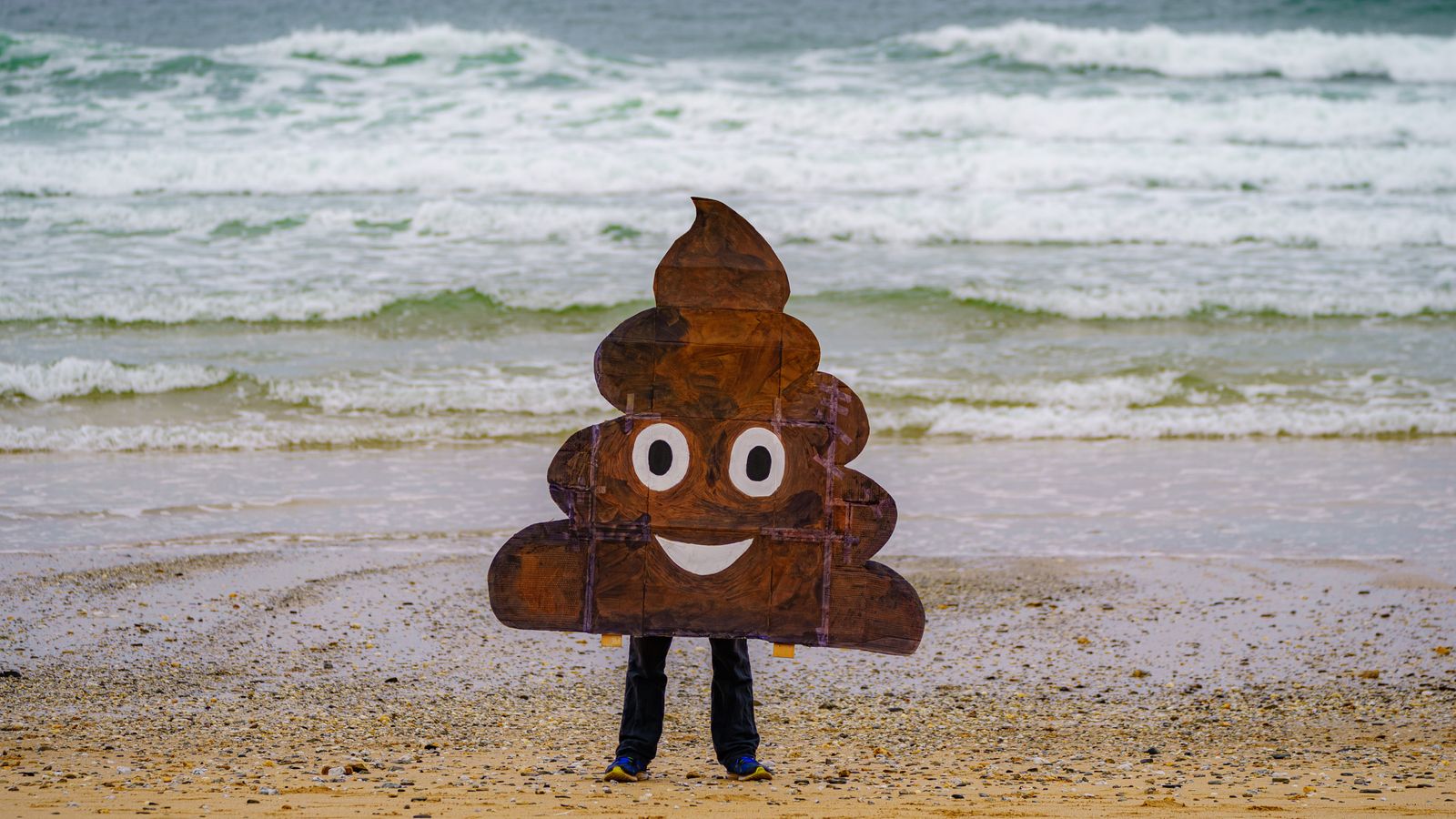Water firms have apologised for sewage spills and vowed to clean up their act – but why do these spills happen in the first place?
Sky News looks at why raw sewage ends up in the river and seas and what water companies are doing about it.
Why is sewage pumped into the sea and rivers?
England’s sewage system is made up of pipes that carry rainwater and waste water from people’s toilets, bathrooms and kitchens all in the same pipes.
If there’s a lot of rain, there’s the risk of these pipes becoming overwhelmed and the sewage backing up into people’s houses.
To lower that risk, instead of all the raw sewage ending up at the water treatment plant, some of it is pumped through storm overflows and into the sea or rivers.
This causes the kind of incidents seen last year, when an idyllic Cornwall cove turned brown as it was flooded with sewage and Bexhill swimmers were met with floating faeces in the water.
Using storm overflows is supposed to be an occasional measure – but concerns about water companies regularly dumping sewage have been a concern for some time.
How regularly is sewage discharged into England’s waters?
In 2022, sewage was pumped into England’s waters on at least 301,091 occasions – 824 a day on average.
The duration of spills overall added up to 1.75 million hours of sewage flowing into our rivers and seas last year.
The number of sewage dumps for 2021 was 372,533 – an average of 1,020 a day.
But the Environment Agency said the decrease was “largely down to dry weather, not water company action”.
Why are the sewage spills so controversial?
Sewage spills make people sick with illnesses including gastroenteritis, ear, nose and throat infections and eye infections.
They are supposed to be used as a last resort but the figures show how often water companies are resorting to them.
Campaigners are frustrated that the £10bn plan water companies have come up with will be funded through higher water bills for customers.
Musician and environmental campaigner Feargal Sharkey said the apology was “nothing to celebrate”.
“What I am actually hearing is no apology for the fact we have paid them for a service we haven’t got, they are now suggesting we pay them a second time for a service we haven’t had,” he told BBC Radio 4’s Today programme.
“We should have an apology for the suggestion they are going to put bills up by £10bn for their incompetence and their greed.”
What have water companies said about the spills – and what’s happening now?
Water and sewage firms in England have issued a public apology for “not acting quickly enough” on spills.
Industry body Water UK said campaigners were “right to be upset about the current quality of our rivers and beaches” as it vowed to spend £10bn the “biggest modernisation of sewers since the Victorian era”.
What does the package include?
• Enlarging and improving pipes and increasing the capacity of sewage treatment works, so infrastructure can better cope with excess water.
• Installing the equivalent of thousands of Olympic-sized swimming pools to hold surges in rainwater that would otherwise overload the system.
• Treating overflow spills so they have less impact on the environment.
• Setting up a National Environment Data Hub to provide the public with near real-time information on all of England’s 15,000 sewage overflows.
• Replacing concrete with grass and ponds to reduce rainfall run-off entering sewers and overloading them.
• Supporting up to 100 communities to create new protected waters for swimming and recreation.
Please use Chrome browser for a more accessible video player
Read more:
Water firms to face unlimited fines for polluting
Water firms apologise for sewage discharges
Who’s paying?
Household water bills will go up to pay for the planned improvements.
The chair of Water UK has confirmed that while companies will provide the initial payment for investment, they will reap the money back through increases to bills.
Speaking to BBC Breakfast, chair of Water UK Ruth Kelly said customers will be contributing to the works for 50 years “or perhaps even longer, maybe up to 100 years”.
Will the plans mean an end to sewage spills?
No.
The package aims to cut sewage overflows by up to 140,000 each year, compared to 2020 levels.
But Ms Kelly admitted sewage spills won’t be stopped completely because of the Victorian-era design of the system.
“You wouldn’t design a system like that today, but that is the system we’ve got. And it is going to take time to put that right,” she said.
“We won’t get to a situation where they (sewage spills) all disappear but we are going to make a dramatic impact on the harm by spills.”
How much do water company bosses get paid?
Bosses of the big water companies regularly receive salaries stretching into millions of pounds.
Water companies were paid £1.4bn in dividends last year.
Analysis by the Lib Dems in 2022 found the average water company exec annual bonus was £670,000 – up a fifth from the previous year.





